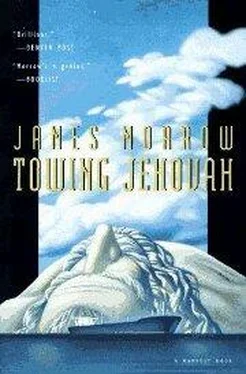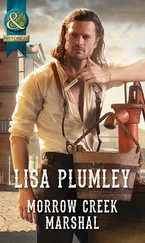“God Almighty, we pray that You may sleep here in peace until You awaken Yourself to glory,” said Father Thomas. Cassie admired the skill with which the priest had adapted the classic rite, the subtle balance he’d struck between traditional Christian optimism and the brute facticity of the corpse. “Then You will see Yourself face to face and know Your might and majesty…”
Hearing her cue, she came forward, Father Thomas’s Jerusalem Bible tucked under her arm.
“Our castaway, Cassie Fowler, has asked permission to address you,” the priest told the sailors. “I don’t know exactly what she intends to say” — an admonitory glance — “but I’m sure it will be thoughtful.”
As she took up the mike, Cassie worried that she might be about to make a fool of herself. It was one thing to lecture on food chains and ecological niches before a class of Tarrytown sophomores and quite another to critique the cosmos before a mob of hardened and depressed merchant sailors. “In all of Scripture,” she began, “it is perhaps the ordeal of Job that best allows me to articulate how rationalists such as myself feel about our cargo.” Swallowing a frigid mouthful of air, she glanced down at the wharf. Lianne Bliss, standing beneath the blue whale, gave her an encouraging smile. Dolores Haycox, slumped against the sequoia, offered a reassuring wink. “Job, you may recall, demanded to know the reason for his terrible losses — possessions, family, health — whereupon the Whirlwind appeared and explained that justice for one mere individual was not the point.” She leaned the Bible’s spine against the rail and opened it near the middle. “ ‘Where were you when I laid the earth’s foundations?’ God asks, rhetorically. ‘What supports its pillars at their bases? Who pent up the sea behind closed doors when it leapt tumultuous out of the womb?’ ” She extended her right mitten, indicating the frozen hippopotamus. “ ‘Now think of Behemoth,’ ” she said, still quoting God. “ ‘What strength he has in his loins, what power in his stomach muscles. His tail is as stiff as a cedar, the sinews of his thighs are tightly knit. His vertebrae are bronze tubing, his bones as hard as hammered iron…’ ” Pivoting ninety degrees, Cassie spoke to the Corpus Dei. “What can I say, Sir? I’m a rationalist. I don’t believe the splendor of hippos is any sort of answer to the suffering of humans. Where do I even begin? The Lisbon earthquake? The London plague? Malignant melanoma?” She sighed with a mixture of resignation and exasperation. “And yet, throughout it all, You still remained You, didn’t You? You, Creator: a function You performed astonishingly well, laying those foundations and anchoring those supporting pillars. You were not a very good man, God, but You were a very good wizard, and for that I, even I, give You my gratitude.”
Accepting both the mike and the Jerusalem Bible from Cassie, Father Thomas ran through the rest of the modified liturgy. “Before we go our separate ways, let us take leave of our Creator. May our farewell express our love for Him. May it ease our sadness and strengthen our hope. Now please join me in reciting the words Christ taught us on that celebrated Mount in Judea: ‘Our Father, which art in heaven, hallowed be Thy name. Thy kingdom come…’ ”
While the Maracaibo’s company prayed, Cassie scanned their smiling cargo, pondering its myriad misfortunes. The voyage had not been kind to God. Nearly a sixth of the right breast had been plundered for fillets. Demolition-bomb craters scarred the belly. Torpedo holes pocked the neck. The chin appeared to have been shaved with a blowtorch. Head to toe, the bites of predators and the ravages of ice alternated with vast swampy tracts of decay. A Martian happening upon the scene would never guess that the thing these mourners were entombing had once been their principal deity.
“…and the power and the glory. Amen.”
As Lou Chickering broke from the crowd and strode across the pier, tears sparkling in his eyes, Cassie recalled the many times she’d heard his mellifluous baritone drifting upward from the engine flat, reciting a soliloquy or belting out an aria. Reaching the shore of the encapsulated bay, the gorgeous sailor threw back his head and sang.
Swing low, sweet chariot, Comin’ for to carry me home, Swing low, sweet chariot, Comin for to carry me home.
Now the entire company joined in, over a hundred voices melding into a thunderous dirge that reverberated off the great frozen dome.
I looked over Jordan, an’ what did I see, Comin’ for to carry me home? A band of angels comin’ after me, Comin’ for to carry me home.
“All right, Professor Ockham, you win,” said Di Luca, stroking his stole. “This was all meant to be, wasn’t it?”
“I believe so.”
Swing low, sweet chariot, Comin’ for to carry me home…
“Tonight I’ll compose a letter.” The cardinal steadied himself on the bridge rail. “I’ll tell Rome the corpse was incinerated as per the consistory’s wishes — and then, with Van Horne’s permission, I’ll send it.”
“Don’t bother,” said Father Thomas. “Three hours ago you faxed the Holy Father just such a message.”
“What?”
“I don’t like situational ethics any more than you do, Tullio, but these are troubled times. Your signature’s not hard to forge. It’s fastidious and crisp. The nuns taught you well.”
If you get there before I do, Comin’ for to carry me home, Jes’ tell my friends that I’m a-comin’ too, Comin’ for to carry me home.
Cassie wasn’t sure which aspect of this exchange disturbed her more: Father Thomas’s descent into expedience, or her realization that Rome was not about to finish the job Oliver had so badly botched.
Swing low, sweet chariot, Comin’ for to carry me home…
The cardinal glowered but said nothing. Thomas kissed his Bible. Cassie closed her eyes, allowing the spiritual to coil through her unquiet soul, and by the time the last echo of the last syllable had died away, she knew that no being, supreme or otherwise, had ever received a more sonorous send-off to the dark, icy gates of oblivion.
The Maracaibo sailed southeast, crashing through the Arctic Ocean at a brisk sixteen knots as she headed toward the coast of Russia. For Thomas Ockham, the mood aboard the tanker was difficult to decipher. Naturally the sailors were delighted to be going home, but beneath their happiness he sensed acute melancholy and a grief past understanding. On the night of their departure from Kvitoya, a dozen or so off-duty deckies gathered in the rec room for a kind of eschatological hootenanny, and soon the entire superstructure was resounding with “Rock of Ages,” “Kum-Ba-Yah,” “Go Down Moses,” “Amazing Grace,” “A Mighty Fortress Is Our God,” and “He’s Got the Whole World in His Hands.” The next day at noon, Thomas celebrated Mass as usual, and for the first time ever a whopping ninety percent of available Christians showed up.
As it turned out, the port of Murmansk boasted a deep-water mooring platform, the sort of rig that allowed a tanker to discharge her cargo directly into seabed pipes without entering harbor. Van Horne arranged the transaction over the ship-to-shore radio, and within four hours of hooking up, the Maracaibo had been pumped dry. Although the Russians could not comprehend why the Catholic Church was giving them eight million gallons of Arabian crude oil for free, they quickly stopped looking this gift horse in the mouth. Winter was coming.
On the morning of September 25, as the Maracaibo drew near the Hebrides, the urge to think overcame Thomas. He knew just what to do. Early in the voyage, he’d discovered that a supertanker’s central catwalk was the perfect place for contemplation, as conducive to quietude as a monastery arcade. One slow march down its length and back, and he had effectively penetrated some great mystery — why existing TOE equations failed to accommodate gravity, why the universe contained more matter than antimatter, why God had died. A second such march, and he had ruthlessly generated a thousand reasons for calling his answer invalid.
Читать дальше












